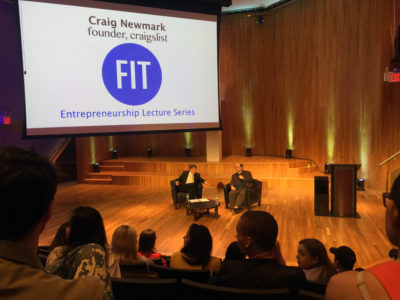
“I don’t see the point of having enormous amounts of money,” said Craig Newmark, founder of the classified advertisements site Craigslist. The web entrepreneur and noted philanthropist visited FIT on October 10 to discuss his progressive outlook, and his namesake site. A self-described “old-school nerd,” Newmark, 64, wore the kind of slouchy-yet-stylish clothes that suggested he’d be more comfortable in front of a computer than a Manhattan audience.
Anyone seeking strategies for masterminding a successful business would have been startled: Newmark more or less lucked into the creation of Craigslist. “It was a happy accident,” he said. In the mid-’90s, while living in San Francisco, he began emailing his friends listings of art- and technology-themed events that he thought were cool, such as the community art happening Burning Man. Without intending to, he garnered a significant following.
The initial idea, he said, was to provide a free service, and he only reluctantly monetized the site—by charging employers for posting Help Wanted notices—in 1999. “I hired someone to write billing code, because I didn’t know how to do that,” he explained. When the time came for him to name the site, he said, “My friends told me that everyone was already calling it Craig’s List, and that it was my brand. Then they had to tell me what a ‘brand’ is.”
Asked how his team came up with the various categories on the site, Newmark replied, “We didn’t. People using the site told us what they wanted; popular demand was what drove growth.” In 2000, he shifted away from his management role at the company because, he said, “People told me that as a manager, I suck. And they were right.”
Still, he made out well enough—Forbes estimates his worth at $1.3 billion—to donate significant sums to causes he believes in. He supported Wikipedia’s effort to stop the harassment of women who write and edit that online encyclopedia, and he has funded initiatives to thwart the proliferation of fake news. When he created Craigslist, he said, he couldn’t have imagined that one day “certain bad actors” would manipulate online information the way, for example, Russian operatives did in the 2016 election. “We engineers are clueless in many ways,” he said. “I didn’t anticipate that people would want to game the system.”
William Reinisch, chair of FIT’s Entrepreneurship Department, interviewed Newmark and moderated the discussion. This event, the first in the department’s Entrepreneurship Lecture Series, was produced in conjunction with the Jay and Patty Baker School of Business and Technology.
